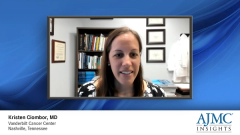
Uptake of HER2 Therapy in mCRC
Kanwal Raghav, MD, MBBS, provides his closing insights, with a focus on HER2-targeted therapy uptake in metastatic colorectal cancer.
Episodes in this series

Kanwal Raghav, MD, MBBS: Uptake of HER2-targeted therapy in metastatic colorectal cancer is evolving, and it’s increasingly becoming better. Most of the trials that we’re talking about are 4 or 5 years old at the maximum. It takes a learning curve, especially to engage on a low-prevalence biomarker.
The NCCN [National Comprehensive Cancer Network] has 2 dual anti-HER2 regimens on their compendium, as well as trastuzumab deruxtecan, which is an antibody-drug conjugate. Prior to 2017 or 2018, there wasn’t even a HER2-targeted therapy available to patients. Going by that standard, the community and oncologists throughout the United States and world are recognizing the importance of this biomarker, and we’re increasingly seeing that these biomarkers are being tested. Granted, we have to continue educating oncologists in the community who don’t often see this, because it’s only found in about 2% to 3% of all unselected colorectal cancer and probably about 5% to 6% of RAS and BRAF wild-type colorectal cancer. Education is key. But as we develop more clinical trials and therapeutics, the uptake will evolve and become better.
The good point about HER2 is that it can be tested very easily. Even if you don’t have an NGS [next-generation sequencing] panel, immunohistochemistry is available with almost every oncology laboratory that looks at cancer because it’s a common biomarker that’s tested for breast cancer and gastric cancer. None of our therapies are FDA approved. That’s the line that we’re trying to cross with this agent. We’d like to get some FDA-approved agents in this line so that people can benefit not just in the United States but throughout the world.
To summarize our discussion, HER2 is a small but important subset of metastatic colorectal cancer. I urge all oncologists to try to identify these patients as early as possible in their treatment continuum because It has a tremendous therapeutic impact on the lives of these patients with regard to available therapies, and we need to identify these patients so we can further research and help all patients in this subset. We’ve made headway in this, but there’s a long way to go. Early identification, early referral, and use of anti-HER2 therapy are the key factors that can help our patients with HER2-amplified metastatic colorectal cancer.
Transcript edited for clarity.
Newsletter
Stay ahead of policy, cost, and value—subscribe to AJMC for expert insights at the intersection of clinical care and health economics.












